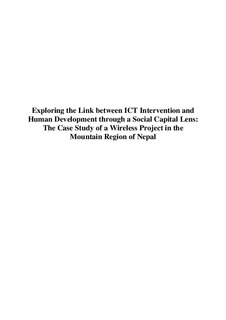| dc.contributor.author | Thapa, Devinder | |
| dc.date.accessioned | 2012-09-25T12:14:49Z | |
| dc.date.available | 2012-09-25T12:14:49Z | |
| dc.date.issued | 2012 | |
| dc.identifier.isbn | 978-82-7117-709-6 | |
| dc.identifier.issn | 1504-9272 | |
| dc.identifier.uri | http://hdl.handle.net/11250/139721 | |
| dc.description | Doctoral dissertation in information systems at the University of Agder, Kristiansand | no_NO |
| dc.description.abstract | While it is generally accepted that information and
communication technology (ICT) can lead to development, the
process through which this may happen remains unclear. At the
core of this debate is the very definition of the term
‘development’. In this thesis, I adopted Amartya Sen’s definition.
According to Sen (1999), human development is built upon a
particular capability approach. He inferred that human
development is the enhancement of human capabilities (freedom
of choice) in order that people can live a life which they value
and have reasons to value. The capability approach has, however,
been criticized for its individualistic stance. In responding to this
criticism, this thesis integrated the societal level by adding
collective capabilities to conceptualize development. Such
capabilities, which are not simple aggregates of individual
capabilities, are built on collective action that can be fostered
through social capital. Social capital is characterized as shared
norms or values that promote social cooperation within and
between communities. It can be further categorized into three
forms: bonding, bridging, and linking social capital. Bonding
refers to networks between homogeneous groups of people,
bridging refers to networks between socially heterogeneous
groups, and linking refers to vertical ties between different
hierarchies of power and social status. | no_NO |
| dc.language.iso | eng | no_NO |
| dc.publisher | Universitet i Agder / University of Agder | no_NO |
| dc.relation.ispartofseries | Doctoral dissertations at University of Agder;46 | |
| dc.title | Exploring the link between ICT intervention and human development through a social capital lens : The case study of a wireless project in the mountain region of Nepal | no_NO |
| dc.type | Doctoral thesis | no_NO |
| dc.type | Peer reviewed | no_NO |
| dc.subject.nsi | VDP::Social science: 200::Economics: 210::Business: 213 | no_NO |
| dc.subject.nsi | VDP::Technology: 500::Information and communication technology: 550 | no_NO |
| dc.source.pagenumber | 1 v. | no_NO |
